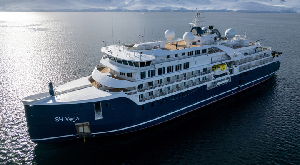- Home - News
- TWI News | TV
- Polls
- Year In Review
- News Archive
- Crime & Punishment
- Politics
- Regional
- Editorial
- Health
- Ghanaians Abroad
- Tabloid
- Africa
- Religion
- Election 2020
- Coronavirus
- News Videos | TV
- Photo Archives
- News Headlines
- Press Release
Editorial News of Wednesday, 24 January 2007
Source: The Statesman
Editorial: A case for moving the political capital from Accra
At the dawn of our Golden Jubilee, as at the dawn of our Independence 50 years ago, it is time to think big. In that spirit, The Statesman wants the nation to consider a follow-up to the bold idea proposed by a contributor to this paper, Dr Bondzi-Simpson in the January 5 edition.
Writing to The Statesman, the thinker and legal expert says, "Ghanaians are preparing to celebrate 50 years of independence as an independent country. Celebrating a significant milestone is good. Even better is reflecting over progress made and hindrances encountered over the 50 year period. And better still - ie, best of all – is to plan for the next 50 years and beyond.” He continues, “It will be appropriate, I believe, for Government to paint a grand picture of Ghana for the next 50 years and share its vision with Ghanaians.”
He suggests as follows:
(1) Parliament should be relocated to a more centrally-located area, an area easily accessible to all Parliamentarians, and with considerable potential for infrastructural development. Sunyani will be a suitable location for a relocated Parliament.
(2) The Supreme Court should also be relocated to Kumasi, Ghana"s second city and also a city quite centrally located.
(3) The Presidency should remain in Accra, but Ministries should be distributed the country over. Indeed every Regional Capital should have at least one Ministry. Cape Coast, for example, will be the ideal seat for the Ministries of Education and of Tourism. Sekondi, will be suitable for the Ministry of Ministries responsible for Mines, Forestry and/or Environment, Tamale could have the Ministry of Interior or of Culture, and Ho the Ministry of Agriculture.
Dr Bondzi-Simpson cited the Province of Ontario of the Dominion of Canada which has Ministries spread all over the Province. “This decentralisation,” he argues, “has served the Province and the Dominion very well. The model proposed is less radical, less expensive and less cumbersome than developing a new capital city as has done by Nigeria, Tanzania and Malawi.”
The Statesman believes such bold, practical even if ambitious ideas should be brought into the national discourse as we celebrate Ghana@50. Indeed, it will be a more equitable and responsible way of spreading wide the areas of socio0ecoomic activity in Ghana with the view of making the country accessibly smaller and empowering a far greater number of our people.
It is a big, bold idea, which may be controversial but worthwhile. In spite of the lawyer’s wise counsel The Statesman believes the debate wouldn’t be complete if the idea of splitting Ghana’s capital city into two distinct cities, one being the commercial capital and the other the Perhaps, we can also give some consideration to making a split of our national capital. Make Accra the Commercial Capital and somewhere in the northern sector of the country, further north of Kumasi, the Political Party.
Ghana is, as it was 50 years ago, brimming with hope for the future and pride at being an example that all of African can follow. Our political leadership got us lost along the way, but we have found our way back to a hopeful path. Our economy has begun to stabilise, absolute and extreme poverty are declining, and we have the makings of a truly healthy democracy.
But as the work of Ernest Aryeetey and other leading Ghanaian economists has shown, our increasing riches are not being evenly distributed through our regions. Development initiatives continue to favour the south, but cities like Accra and Tema are growing indiscriminately on an ad hoc basis that is giving rise to fetid slums, uncontrollable garbage, environmental destruction and unaffordable housing.
The perception also remains strong that Ghana is a nation run by and for the Akan rather than for all its ethnic groups, this may even make this suggestion of taking the capital from Accra be mischievously misconstrued by some as a grand NPP scheme to take the capital to an Akan area. But, that is not the kind of proposal we are associating ourselves with.
So, how will moving the capital address these problems? For those who fear change consider this quiz: name one nation where wealth flows evenly through the regions that has only one thriving urban centre.
Progressive and wealthy social democracies that manage to thrive in the global marketplace while serving their citizens with a measure of equality through all regions have multiple urban centres. Germany, for example, is a city of literally thousands of medium-sized towns and cities, only three of which (Berlin, Hamburg, and Munich) have populations of more than one million people. Canada’s largest cities are spread with remarkable evenness over the country’s vast terrain, and like Germany only three of those cities exceed the one million mark. Its capital, Ottawa, is not one of them, but its financial capital, Toronto, is. The situation is quite similar to Sub-Saharan Africa’s most advanced economy, South Africa.
By spreading out these urban economic engines these and other countries have avoided some of the problems Ghana faces in regional disparity. Where there is regional disparity in these countries tends to be where there is no major economic centre.
By moving, for example, our political capital to a smaller township in the geographic centre or north of Ghana, the developmental obsession with the south will finally cease, along with any ethnic biases based on regional discord, and other options will open for migrants looking for greener pastures in the city. Imagine, for example, scenic Kintampo, in the Brong Ahafo Region, as our new capital, a place fancied by one-forward looking politician.
Brong Ahafo Region is by no means economically deprived compared to the rest of Ghana, but by virtue of its location in the centre of the country, creating a fully functional national capital in its midst would force the opening of Ghana’s infrastructure, providing better access to and from the poorest regions. Regardless of which specific city or region might ultimately be chosen, placing the political capital or moving some organs or institutions of state in a more central area or spread nationwide will necessitate the development of better roads, railways, and general infrastructure to that location or those locations from all parts of Ghana.
In the short-term thousands of jobs would be created, but this is not just a short-sighted make-work development scheme.
If the argument is for moving the political capital northward, to create a fully functioning political and diplomatic capital in an ordinary Ghanaian township is a serious undertaking that would require careful urban planning, something that has been lacking in our entire pre and post-independence history.
As a result of our historic short-sightedness, we have no model city to be proud of, in which foreign dignitaries can walk in comfort and be dazzled, and on which to base our urban policy.
In the spirit of thinking big at this momentous time, Ghana needs a national capital we can be proud of, that will be a model city not only to Africa but to the world.
The creation of that city must be well implemented so that our own politicians can willingly move their offices and families there. The central location will give them greater access to the whole of the country and not just the Accra area.
The result should be more even development and distribution of wealth and finances throughout the country.
Accra will remain the financial capital and most populous city of this nation. Given that urbanisation is not something Government can simply stop with a few feel-good small-scale development projects, it makes good sense to develop other options.
By creating a world-class Ghanaian political capital we can develop a proper model of what city planning in this nation should be.
We are left with a capital city to be proud of and a still-thriving financial capital in Accra that will further benefit from improved urban planning, as has happened to Lagos since the relocation of Nigeria’s capital to Abuja in 1991. Abuja was also a city that was specifically planned to prevent bias in an ethnically diverse nation. In that case, the city was planned by American consultants and Japanese architects.
Ghana still has the unique opportunity to create the first planned, designed, and made-in-African city, built by and for Ghanaians, of this new age.
This city can be designed to incorporate symbols from our many ethnic groups and three major religious groups (Christians, Muslims, and Traditionalists). If the political capital is to be moved it is essential that we do not then neglect the former capital, as the British did Cape Coast when Accra became the capital in 1877.
As unlikely as this event may seem given the sheer size of Accra and the amount of dollars changing hands there every day, the lessons learned in designing a 'perfect capital’ must also be used to benefit all Ghanaian cities. At the same time, Cape Coast and other under-developed tourist havens can be fully realised using the same model.
The option of creating a new Ghanaian political capital or diversifying state organs and institutions geographically is one with great potential for Ghana, and needs to be seriously considered.










